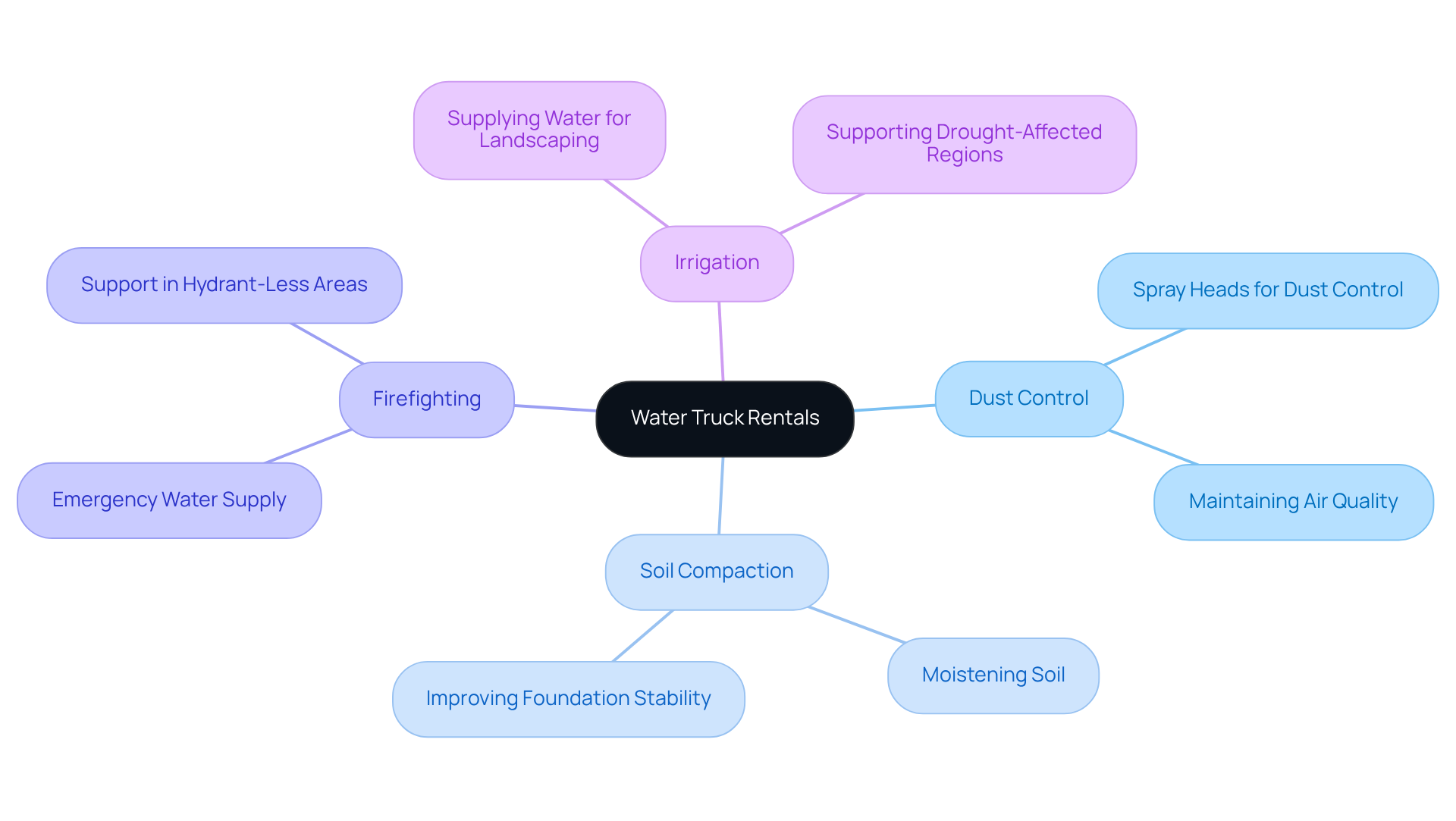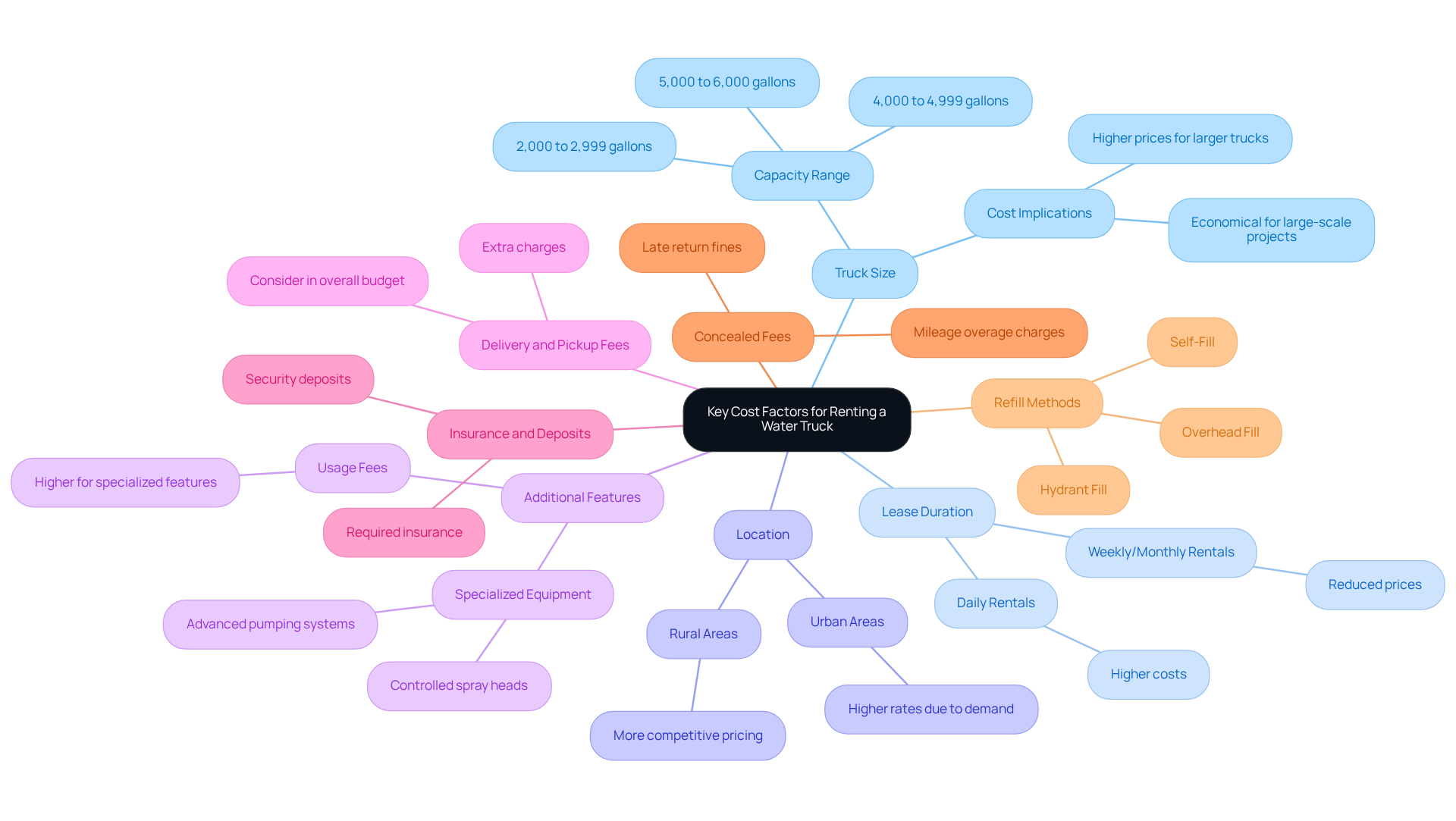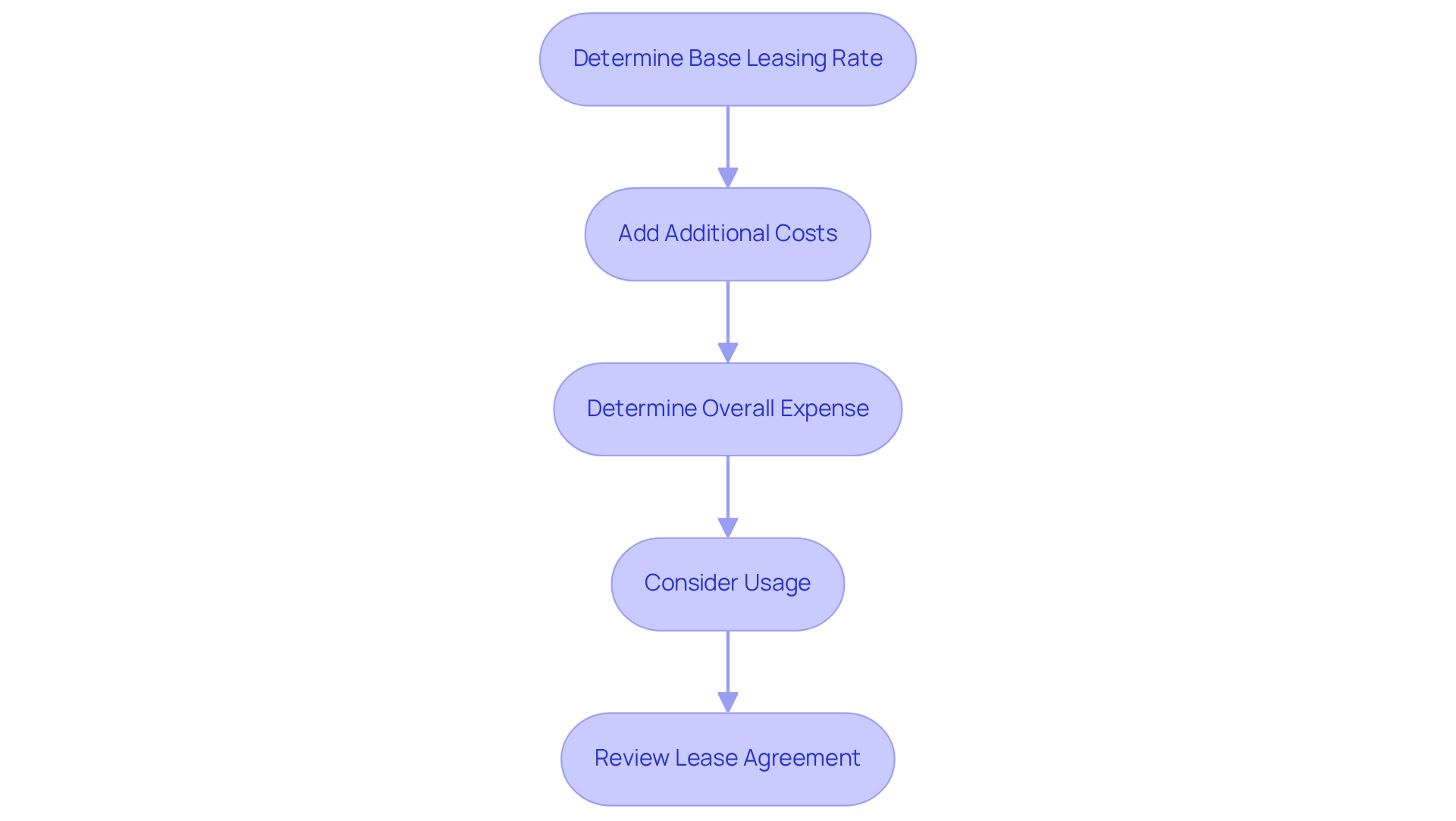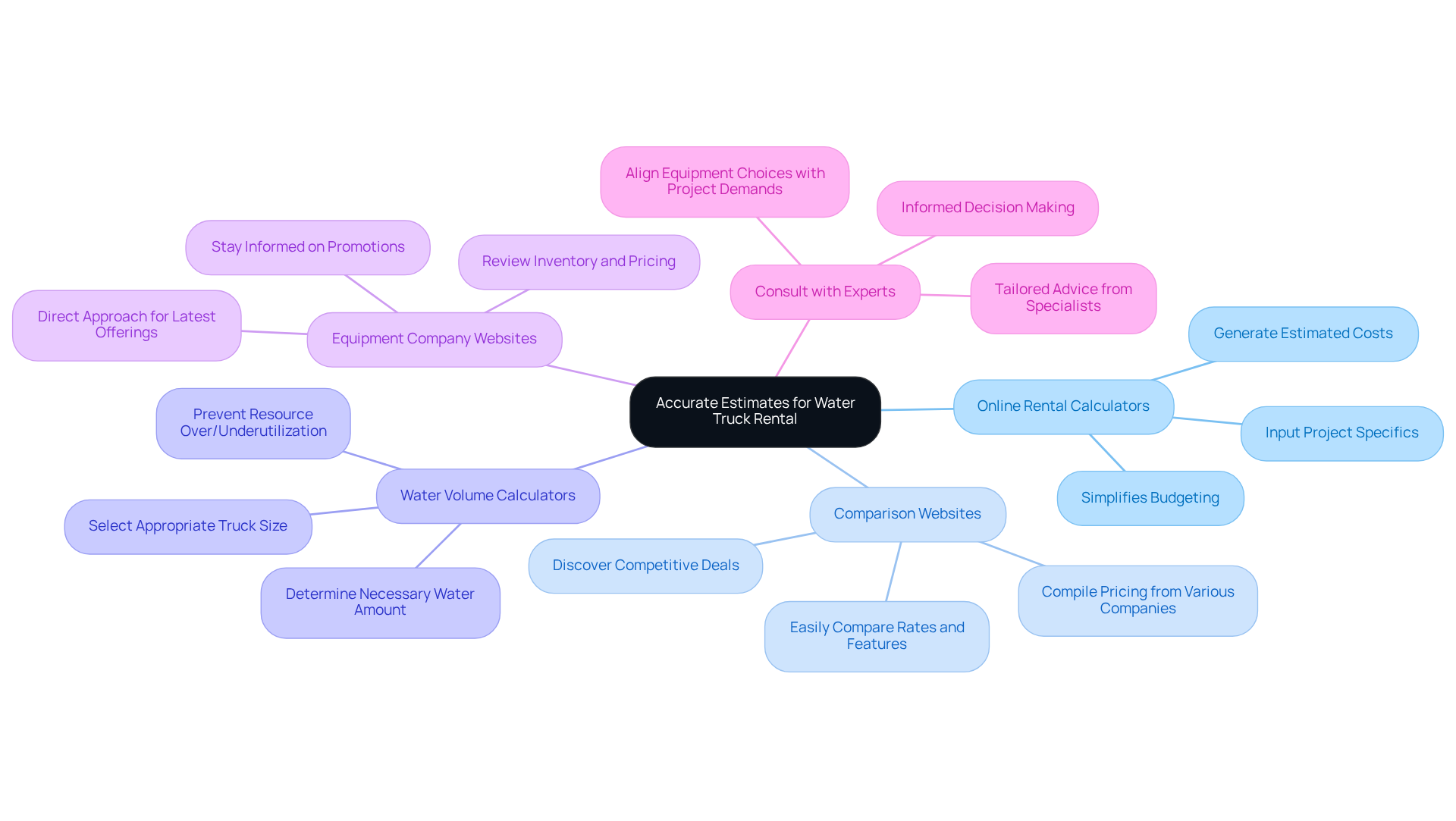Overview
Renting a water truck involves varying costs that are significantly influenced by several key factors:
- Truck size
- Lease duration
- Location
- Additional features
Typically, larger trucks and longer lease terms lead to lower per-gallon costs, making it essential to understand these dynamics for effective budgeting. This article outlines a systematic approach to calculating total rental expenses, emphasizing the necessity of grasping base rates, additional fees, and potential concealed costs. By doing so, you can ensure a well-planned project that stays within budget.
Understanding the base rates is crucial, as they serve as the foundation for your rental costs. Additional fees may arise depending on the specific requirements of your project, such as insurance or delivery charges. Moreover, concealed costs can catch you off guard if not properly accounted for. By being aware of these elements, you can avoid unexpected expenses and make informed decisions.
In summary, effectively budgeting for your water truck rental requires a comprehensive understanding of the costs involved. By considering truck size, lease duration, and additional features, you can optimize your rental experience. Take action today by assessing your project needs and exploring reliable rental options to ensure a successful outcome.
Key Highlights:
- Water trucks transport fluids for applications like construction, landscaping, and firefighting, typically ranging from 2,000 to 5,000 gallons.
- Key uses include dust control, soil compaction, firefighting support, and irrigation.
- The liquid vehicle leasing market is projected to grow from USD 2.16 billion in 2024 to USD 4.33 billion by 2033.
- Factors influencing rental costs include truck size, lease duration, location, additional features, delivery/pickup fees, insurance, and concealed fees.
- Calculating total rental costs involves determining the base leasing rate, adding extra fees, and considering usage beyond the agreed period.
- Tools for accurate estimates include online rental calculators, comparison websites, water volume calculators, equipment company websites, and expert consultations.
Introduction
Understanding the costs associated with renting a water truck can be a challenging endeavor, especially considering the myriad factors that influence pricing. As industries ranging from construction to landscaping increasingly depend on these specialized vehicles for efficient fluid transport, the demand for water truck rentals continues to surge. This guide explores the essential elements that determine rental costs, providing insights into effective budgeting and navigating the complexities of leasing. How can project managers ensure they are making informed and economical choices when renting a water truck?
Understand Water Truck Rentals
Liquid transport vehicles are specialized machines designed to carry and supply fluids for a variety of applications, including construction, landscaping, and firefighting. Typically, these vehicles range in size from 2,000 to 5,000 gallons and can be equipped with features such as spray heads for effective dust control or irrigation. Understanding the purpose of these vehicles is critical in determining whether leasing one is essential for your project, as well as identifying the specific features you may require.
Common uses for water trucks include:
- Dust Control: Keeping construction sites and unpaved roads dust-free is essential for maintaining air quality and safety.
- Soil Compaction: Moistening soil improves compaction during construction, ensuring a solid foundation for activities.
- Firefighting: Providing a vital liquid resource in areas lacking hydrants, these vehicles support firefighting efforts during emergencies.
- Irrigation: Supplying liquid for landscaping projects ensures that plants receive adequate hydration, especially in drought-affected regions.
The liquid vehicle leasing sector was estimated at approximately USD 2.16 billion in 2024 and is projected to reach USD 4.33 billion by 2033, underscoring the growing demand for these services. Industry specialists emphasize that the significance of liquid transport vehicles in landscaping and firefighting is paramount, as they deliver crucial supplies efficiently and effectively. Before proceeding with a lease, evaluate your project requirements to ensure that a liquid vehicle is the right choice.

Identify Key Cost Factors
Several factors significantly influence how much to rent a water truck. Understanding these factors can help you budget effectively and figure out how much to rent a water truck that meets your needs.
- Truck Size: Water trucks typically range from 2,000 to 6,000 gallons. Larger trucks, particularly those between 4,000 and 6,000 gallons, generally command higher leasing prices. However, knowing how much to rent a water truck can make it more economical for large-scale projects due to the fewer trips needed for refills, ultimately conserving both time and expenses.
- Lease Duration: The leasing cost can vary considerably based on the duration. When considering how much to rent a water truck, hiring it for a week or month often leads to reduced prices compared to daily hires, making extended agreements a more economical choice.
- Location: Geographic position plays a crucial role in rental pricing. Urban areas often experience higher rates, which influences how much to rent a water truck, due to increased demand and operational costs, while rural locations may offer more competitive pricing. Additionally, market competition can influence these rates as new businesses enter the leasing market.
- Additional Features: Trucks equipped with specialized features, such as controlled spray heads or advanced pumping systems, may incur higher usage fees. Assessing the specific needs of your project can help you understand how much to rent a water truck and whether these features are necessary for your operations.
- Delivery and Pickup Fees: Many rental companies charge extra for delivering the truck to your site and for the subsequent pickup. It is essential to consider expenses such as how much to rent a water truck in your overall budget to avoid surprises.
- Insurance and Deposits: Be mindful of any required insurance or security deposits, as these can add to your upfront costs. Understanding how much to rent a water truck can help mitigate these expenses while providing necessary coverage for potential liabilities.
- Concealed Fees: Typical concealed fees for vehicle leasing may include mileage overage charges and late return fines. Being aware of how much to rent a water truck can further assist in budgeting effectively and help avoid unexpected charges.
- Refill Methods: There are three primary methods to replenish a liquid vehicle: hydrant fill, overhead fill, and self-fill. Understanding these methods can provide practical insights for operational considerations, ensuring you make the most informed decisions for your project.

Calculate Total Rental Costs
To calculate the total rental costs for a water truck, follow these essential steps:
-
Determine the Base Leasing Rate: Begin with the daily, weekly, or monthly leasing rate provided by the leasing company. For instance, if the daily rate is $450, the weekly rate is $1,500, and the monthly rate is $3,750, select the rate that corresponds with your duration of use.
-
Add Additional Costs: Include any extra fees for delivery, pickup, insurance, or additional features. For example, if shipping amounts to $100 and insurance is $50, include these in your base rate. Be mindful that typical extra charges in water vehicle leases may also encompass mileage overuse fees and penalties for late returns.
-
Determine Overall Expense: Merge the base leasing rate with any extra charges. For example, if you rent the truck for a week at $1,500, plus $100 for delivery and $50 for insurance, your total cost would be:
- Total Cost = Base Rate + Delivery Fee + Insurance
- Total Cost = $1,500 + $100 + $50 = $1,650
-
Consider Usage: If you expect to require the vehicle for longer than the agreed-upon period, take into account the possible expenses of prolonging the hire. Excess usage rates can significantly increase your total expenses, with charges of 1.5 times the standard hourly rate for usage over 8 hours but less than 16 hours, and 2 times the standard hourly rate for usage over 16 hours.
-
Review Lease Agreement: Always read the lease agreement carefully to understand any potential hidden fees or charges that may apply. Specific attention should be paid to mileage limits and additional service charges, as these can accumulate quickly if not accounted for.
By following these steps, you can ensure a thorough understanding of how much to rent a water truck, which will allow for improved budgeting and planning for your project.

Utilize Tools and Resources for Accurate Estimates
To obtain precise estimates for your water truck rental, leverage the following tools and resources:
- Online Rental Calculators: Many rental companies provide online calculators that allow you to input project specifics, generating an estimated rental cost tailored to your needs. This tool not only simplifies the budgeting process but also ensures you have a clear understanding of potential expenses.
- Comparison Websites: Utilize platforms that compile pricing from various companies, enabling you to easily compare rates and features. This approach can lead to discovering the most competitive deals available, ensuring you maximize your investment.
- Water Volume Calculators: For projects requiring a specific water volume, online calculators can help determine the necessary amount based on project size. This guidance is crucial in selecting the appropriate truck size, preventing over or underutilization of resources.
- Equipment Company Websites: Explore the websites of local equipment companies, such as EZ Equipment Rental, to review their inventory, pricing, and any ongoing promotions. This direct approach allows you to stay informed about the latest offerings and special deals that may benefit your project.
- Consult with Experts: If you're unsure about your needs, consider contacting a construction project management specialist or a representative from a leasing company. Their tailored advice can be invaluable in aligning your equipment choices with project demands, ensuring you make informed decisions.
In the context of the expanding water truck leasing market, projected to reach USD 4.6 billion by 2024, utilizing these tools can help you navigate your options effectively. As noted in industry insights, when determining how much to rent a water truck, it's essential to account for initial costs, expected lifetime, and overhead costs. This comprehensive approach ensures you make informed decisions that align with your project goals.

Conclusion
Understanding the intricacies of water truck rentals is essential for making informed decisions that align with specific project needs. This guide emphasizes the importance of evaluating various factors, including truck size, lease duration, and additional features, to determine the most suitable rental options. By grasping these elements, individuals can effectively budget and navigate the rental landscape.
Key arguments presented highlight the significance of understanding cost factors such as geographic location, delivery fees, and potential concealed charges. Furthermore, the article outlines a step-by-step approach to calculating total rental costs, ensuring that all expenses are accounted for, from base rates to additional fees. Utilizing tools and resources like online calculators and comparison websites empowers renters to secure the best deals available.
Ultimately, the growing demand for water truck rentals underscores the relevance of this information. Whether for construction, landscaping, or emergency services, making informed choices regarding rental options can lead to substantial time and cost savings. Engaging with the right tools and expert advice can enhance project outcomes and ensure that the necessary resources are available when needed. Embrace these insights to streamline the rental process and achieve project success.
Frequently Asked Questions
What are water truck rentals used for?
Water truck rentals are used for various applications including dust control on construction sites, soil compaction, firefighting, and irrigation for landscaping projects.
What sizes do water trucks typically come in?
Water trucks typically range in size from 2,000 to 5,000 gallons.
What features might water trucks have?
Water trucks can be equipped with features such as spray heads for effective dust control or irrigation.
Why is dust control important on construction sites?
Dust control is essential for maintaining air quality and safety on construction sites and unpaved roads.
How does moistening soil benefit construction?
Moistening soil improves compaction during construction, ensuring a solid foundation for activities.
How do water trucks assist in firefighting?
Water trucks provide a vital liquid resource in areas lacking hydrants, supporting firefighting efforts during emergencies.
What is the significance of water trucks in landscaping?
Water trucks supply liquid for landscaping projects, ensuring that plants receive adequate hydration, especially in drought-affected regions.
What is the projected growth for the liquid vehicle leasing sector?
The liquid vehicle leasing sector was estimated at approximately USD 2.16 billion in 2024 and is projected to reach USD 4.33 billion by 2033.
What should be considered before leasing a water truck?
Before leasing a water truck, it is important to evaluate your project requirements to ensure that a liquid vehicle is the right choice for your needs.




